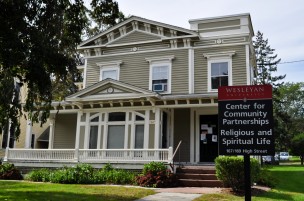
Two student-run community service groups, Let’s Get Ready (LGR) and WesESL (English as a Second Language) have lost their work-study funding from the Office of Community Service (OCS). Work-study students who worked for these two community engagement programs used to have the opportunity to receive pay for their time. This is no longer the case after the programs lost their federal funding.
“We reviewed the guidelines over the summer, and the programs do not qualify under the literacy initiative,” wrote Director of Community Service and Volunteerism for the Center for Community Partnerships Cathy Crimmins Lechowicz in an email to The Argus. “These are federal funds and we must follow the guidelines provided to us.”
She elaborated that the federal guidelines for literacy initiatives focus on younger students and thus do not include high school or adult students, who are the focus of LGR and WesESL respectively.
A handful of groups still meet this requirement, as they focus on expanding literacy among young children. These groups include Ascend, Cross Street, Green Street Arts Center, Traverse Square, WesReads and WesMath, and the Woodrow-Wesleyan Education Program.
LGR and WesESL comprise a small portion of the students working for OCS.
“Last year, OCS employed about 120 students for literacy initiatives, and Let’s Get Ready and WesESL had 10 students combined getting paid for their work,” Lechowicz said.
WesESL, formerly a mix between work-study students and volunteers, is generally composed of fewer than 20 students per year. Despite their smaller size, the program has an ambitious mission, as they work to provide English lessons to University staff as well as foster a community between Wesleyan staff and students.
Despite a decline in emails from students searching for a paying job, WesESL appears to be pushing through without work-study funding.
“We haven’t been that horribly affected,” said student coordinator Amy Torres ’12. “Having English-teaching experience is good for your resume and a valuable learning experience.”
However, Torres said that the loss of funding is going to change how WesESL and other student groups evolve in the future.
“I think it’s changing the way that we look at the program and how we are going to have to start recruiting,” Torres said.
LGR provides free SAT prep, college application prep, and guidance two nights a week to local students who are at risk. LGR student co-directors Elana Metsch-Ampel ’12 and Stephen Nangeroni ’12 experienced some initial anxiety after learning of the funding loss.
“It was a real resource to be able to combine work study and volunteerism,” Metsch-Ampel said. “We were freaking out in the beginning.”
The co-directors are hopeful about the future of their group despite the loss of federal work-study funding. The group has been able to secure a full staff of volunteer tutors.
“The fact that they are all there because they want to be there is inspiring,” Metsch-Ampel said.
Metsch-Ampel also said that the funding loss changed her opinion of the federal literacy initiative.
“There is a certain irony that the literacy initiative wouldn’t cover high school students trying to get into college,” she said.


Leave a Reply